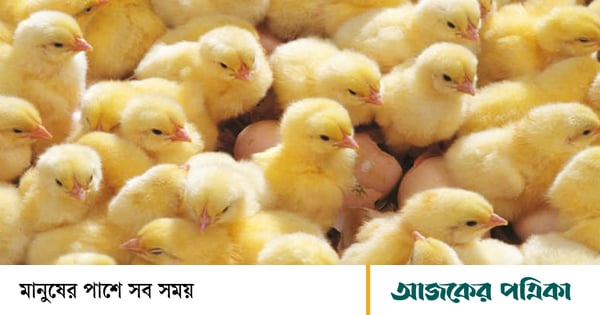The crisis in the country's poultry sector continues. The supply of day-old chicks has resurfaced after the government took the initiative to control the ongoing volatility in the prices of eggs and chickens. Marginal farmers complain that corporates have deliberately reduced the supply of baby by creating an artificial crisis, adding to the pressure on the sector.
This has seen the price of day-old chicks produced from the parent stock (PS) more than double in just a few weeks. Farmers say that this unusual price hike, which began on September 16, has resulted in a significant increase in their cost of production, which is creating a major obstacle in the way of earning a fair profit.
Small and marginal farmers are the most affected by this crisis. It is gradually becoming impossible for them to buy babies at higher prices and run the production. Allegedly, as the government implemented fixed prices for eggs and chickens, corporates are trying to cover their losses by increasing the price of day-old chicks. As a result, the production activities of marginal farmers are hindered due to reduced supply of children. Its impact is not limited to the economic loss of farmers; The country's poultry sector also faces an uncertain future. In this situation, the concerned persons feel that it is necessary to take quick and effective steps to protect the stability of the market and sustain the small farmers.
Control of the corporate cycle
The supply of GP stock to the country's poultry sector is dominated by corporates. These institutions are controlling the production and supply of baby poultry on the one hand, and on the other hand have a major impact on the overall stability of the market. The Bangladesh Poultry Association (BPA) and farmers have alleged that syndicates like Paragon Poultry, CP Bangladesh, Provita Feed, Nahar Agro, Narish Farms and Aftab Hatchery are controlling the chick market. As a result, the baby which was priced at Tk 30-35 till September 15, is now being sold at Tk 55 to Tk 110.
According to estimates given by the BPA, about 3 million chicks are sold every day. Accordingly, if 30 taka extra is taken per child, in 60 days, the corporate circle has grabbed around taka 540 crores from the farmers.
Dissatisfaction of farmers and dealers
Raisul Kabir, a farmer of Chittagong, said that he did not get any response from the order of Lair's baby for one and a half months. Buying broilers and golden chicks at double the price has made it difficult for him to manage his farm.
Habibur Rahman, head of Chittagong region of Kazi Farms Group, said, 'We are selling broiler chicks at 55 taka and layer chicks at 67 taka to dealers. But due to the crisis of children, the price has increased.
Provita feed dealer. Nizam said, 'Earlier I used to buy a baby for 28-30 taka, now I have to buy it for 57-59 taka. This double price is putting us in trouble.'
Mizanur Rahman, dealer of Nahar Agro, said, 'We are selling layer chickens at Tk 110. Similarly, golden chicks, which used to be available at Rs 18-20, are now being bought at Rs 60-65. It is an incredible pressure for us.'
Maruf Adnan, a farmer of Feni, complained, '25 thousand layers of babies are needed, but it is not possible to meet the entire demand even at 84 taka. Small farmers have to buy at higher prices, which makes it difficult for them to survive.'
Dealer Ariful Islam said, 'Companies are not supplying babies as per our demand; Instead, they are selling it in the black market for 90-100 taka. This is destabilizing the market and driving the sector to ruin.'
Stakeholders fear that the crisis is posing serious risks to marginal farmers.
Feed prices have also increased
Along with chicks, feed prices have also gone up. In this, the production cost of farmers is increasing by leaps and bounds. In this situation, they are forced to increase the price of chicken and eggs, which has a direct impact on the common consumers.
Cab's suggestion to break the syndicate
Consumers Association of Bangladesh (CAB) Vice President SM Najer Hossain said, 'Poultry sector is captured by the corporate circle. They sell chicks, feed, medicines and eggs. As a result, the sector is deliberately being thrown into extreme instability.
Najer Hossain also said, 'The government has decided the price of eggs and chicken but has not given any instructions in terms of chicks and feed. In this opportunity, the corporate organizations are looting the profits. To avoid this situation, the government should quickly fix the prices of babies, feed and medicines.'
Future fears and actions
If marginal farmers are forced to go out of business, the market will be completely controlled by corporate entities, which will impose higher prices on consumers. President of Bangladesh Poultry Association Suman Howladar warned, “If the government does not take effective action quickly, the poultry sector will face a deep crisis.” To deal with this crisis, he proposed several actions, namely: determining the precise price of baby and feed and ensuring transparency in the market; Regular market monitoring and strict action against syndicates to prevent artificial crises; Formation of special committees, which will monitor supply and demand and take immediate measures to deal with crisis; Financial assistance to marginal farmers, loans on easy terms and incentives. According to Suman Howladar, if these measures are implemented, it is possible to maintain the stability of the poultry sector and ensure the protection of consumers and farmers.

